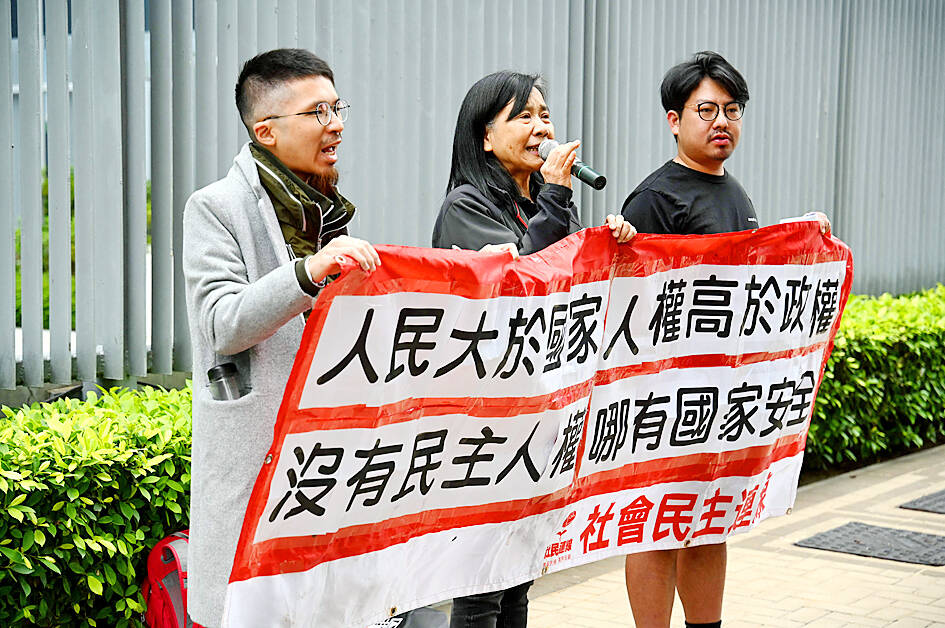Hong Kong democracy advocates yesterday staged a rare public protest against government plans for a new national security law, saying it lacked democratic oversight and human rights safeguards.
Public demonstrations have all but vanished in the Chinese territory since Beijing quelled huge, sometimes violent pro-democracy protests in 2019 and imposed a sweeping National Security Law.
Hong Kong officials now say a further homegrown security law is needed to plug “loopholes,” with Hong Kong Secretary for Justice Paul Lam (林定國) earlier saying that he heard no objections during a month of public consultations that ends today, but Yu Wai-pan, from the League of Social Democrats (LSD), yesterday said that “many Hong Kongers are quite concerned.”

Photo: AFP
“I don’t understand why the secretary for justice said he heard no objection or worry,” Yu said.
The LSD is one of the last remaining opposition groups in Hong Kong and its members have faced multiple prosecutions for their shows of dissent.
Yu and two other activists were surrounded by reporters and more than a dozen police officers as they chanted slogans outside the Hong Kong Government headquarters yesterday.
“National security is important to the people, but it must be based on democracy, freedom and rule of law,” activist Chan Po-ying (陳寶瑩) said.
The government referenced examples in the US and the UK in defending the proposed legislation, but Chan said that comparison was misleading, as Hong Kong is not a democracy.
The month-long public consultation for the new security law, known as Basic Law Article 23, was largely limited to pro-Beijing voices, she said.
Chinese Hong Kong and Macau Affairs Office Director Xia Baolong (夏寶龍) arrived in the territory last week in a tightly choreographed tour to meet with leaders in business and politics.
Xia discussed the security law proposal with two local lawyers’ groups in a closed-door meeting and engaged in “candid exchanges,” the head of the Hong Kong Bar Association told reporters.
Separately yesterday, Hong Kong convicted Joseph John — also known as Wong Kin-chung — of “conspiracy to incite secession,” the first such case involving a dual national.
The Portuguese citizen, 41, pleaded guilty to the national security offense, admitting that he was chair of the UK-based Hong Kong Independence Party and an administrator of its six online platforms.
A diplomatic source said that the Portuguese consulate has been unable to visit John since he was arrested and detained in November 2022.

INVESTIGATION: The case is the latest instance of a DPP figure being implicated in an espionage network accused of allegedly leaking information to Chinese intelligence Democratic Progressive Party (DPP) member Ho Jen-chieh (何仁傑) was detained and held incommunicado yesterday on suspicion of spying for China during his tenure as assistant to then-minister of foreign affairs Joseph Wu (吳釗燮). The Taipei District Prosecutors’ Office said Ho was implicated during its investigation into alleged spying activities by former Presidential Office consultant Wu Shang-yu (吳尚雨). Prosecutors said there is reason to believe Ho breached the National Security Act (國家安全法) by leaking classified Ministry of Foreign Affairs information to Chinese intelligence. Following interrogation, prosecutors petitioned the Taipei District Court to detain Ho, citing concerns over potential collusion or tampering of evidence. The

Seventy percent of middle and elementary schools now conduct English classes entirely in English, the Ministry of Education said, as it encourages schools nationwide to adopt this practice Minister of Education (MOE) Cheng Ying-yao (鄭英耀) is scheduled to present a report on the government’s bilingual education policy to the Legislative Yuan’s Education and Culture Committee today. The report would outline strategies aimed at expanding access to education, reducing regional disparities and improving talent cultivation. Implementation of bilingual education policies has varied across local governments, occasionally drawing public criticism. For example, some schools have required teachers of non-English subjects to pass English proficiency

NEGOTIATIONS: The US response to the countermeasures and plans Taiwan presented has been positive, including boosting procurement and investment, the president said Taiwan is included in the first group for trade negotiations with the US, President William Lai (賴清德) said yesterday, as he seeks to shield Taiwanese exporters from a 32 percent tariff. In Washington, US Trade Representative Jamieson Greer said in an interview on Fox News on Thursday that he would speak to his Taiwanese and Israeli counterparts yesterday about tariffs after holding a long discussion with the Vietnamese earlier. US President Donald Trump on Wednesday postponed punishing levies on multiple trade partners, including Taiwan, for three months after trillions of US dollars were wiped off global markets. He has maintained a 10 percent

TRADE: The premier pledged safeguards on ‘Made in Taiwan’ labeling, anti-dumping measures and stricter export controls to strengthen its position in trade talks Products labeled “made in Taiwan” must be genuinely made in Taiwan, Premier Cho Jung-tai (卓榮泰) said yesterday, vowing to enforce strict safeguards against “origin laundering” and initiate anti-dumping investigations to prevent China dumping its products in Taiwan. Cho made the remarks in a discussion session with representatives from industries in Kaohsiung. In response to the US government’s recent announcement of “reciprocal” tariffs on its trading partners, President William Lai (賴清德) and Cho last week began a series of consultations with industry leaders nationwide to gather feedback and address concerns. Taiwanese and US officials held a videoconference on Friday evening to discuss the